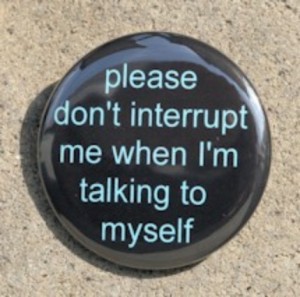Q. What’s the best way to learn how to counsel others?
A. Learning how to counsel yourself (self-counseling).
Yes, there are many ways to learn how to counsel: books, lectures, watching/learning from other counselors, and of course the actual practice of counseling others. All of these are vital components of a counseling education. But I believe that the best counselors of others are those who have learned how to counsel themselves first of all. I agree with Martyn Lloyd-Jones who said that the secret to the Christian life was to “learn how to preach to yourself.”

The best counselors understand themselves, their personalities, their hearts, their strengths, their weaknesses, their limitations, their vulnerabilities, etc., and they have learned how to address these needs with God’s Word and God’s Works from God’s World.
So what does self-counseling involve?
1. Knowing our Bible
The Bible must have priority and primacy in all that we do. It is the only infallible guide and teacher in the world. If we start with ourselves, we are starting with error. But of course it is our error-filled and error-prone minds that process the Bible. That’s why we so much need prayer and the Holy Spirit in all our Bible study (1 Cor. 2:10, 11).
2. Knowing our heart
I know of no better example of self-counseling than Joe Thorn’s excellent book, Note to Self: The discipline of preaching to yourself. Please read and re-read that little book of “heart-surgery” to understand the kind of spiritual dialogue that you should be having with yourself continually. And that in turn will be a huge help to you in ministering God’s Word to others.
But there’s more to self-counseling than preaching God’s Word to yourself. That’s why I said that self-counseling also involves addressing our needs with God’s Works from God’s World. We are not just spiritual beings; we are also physical and social beings. And sometimes our needs are more physical and social than spiritual. The best self-counselors understand their bodily and social needs as well as their spiritual needs, and they also understand the mysterious interaction of these realms of need.
I do not believe that biblical counseling involves only quoting or explaining the Bible. True Biblical counseling also involves using the Bible as our guide to what we can use in God’s Works and God’s World to help ourselves and others. That means we must know more than our Bible and our hearts.
3. Knowing our body
Our physicality affects our spirituality. As our weight, our health, our fitness, our sleep, etc., all impact how we think, feel, learn, pray, etc., we must get to know our bodies.
4. Knowing our past
Have a good think about all the factors in your past that have gone into shaping who you are: your parents, your education, your values, your experiences, etc., all impact who you have become, how you speak, how you think, how you feel, how you act. This is not some Freudian rubbish; it’s basic common sense. And again, the more we can grasp the impact of the past on our present and our future, the better placed we will be to understand, sympathize with, and help others as they move from past and present problems into the future.
5. Knowing our social character
A hugely helpful book for me has been Introverts in the Church by Adam McHugh. I’d say it is vital reading for anyone involved in soul-care. By explaining the multiple differences between extroverts and introverts, McHugh will give you huge insight into yourself and your social behavior, and hence also greater understanding of others’ lives too.
6. Knowing your personality type
Knowing what kind of personality we have will also be a huge help in self-counseling. Questions to consider are: Do you like active or passive roles? Are you task-oriented or people-oriented? How do you respond to challenges and problems? What roles do you take on in a group? What are the strengths of your personality? What are your weaknesses? Are you a one-way or two-way communicator? One of the ways to find out about our personalities is to ask others or to consider the criticisms you’ve received from others over the years. Or why not take a “personality test.” While not infallible, it will at least help you understand the wide range of different personalities that exist and the way personality impacts every area of life.
7. Knowing your learning style
If we are data learners, lots of practical work will be wasted on us. But if we learn mainly by doing, then lots of book work will be pointless. If we can grasp our own learning style, we will be much more able to identify the learning style of others, and help them to learn from us.
What other areas of knowledge would help us become better self-counselors and hence better counselors of others?